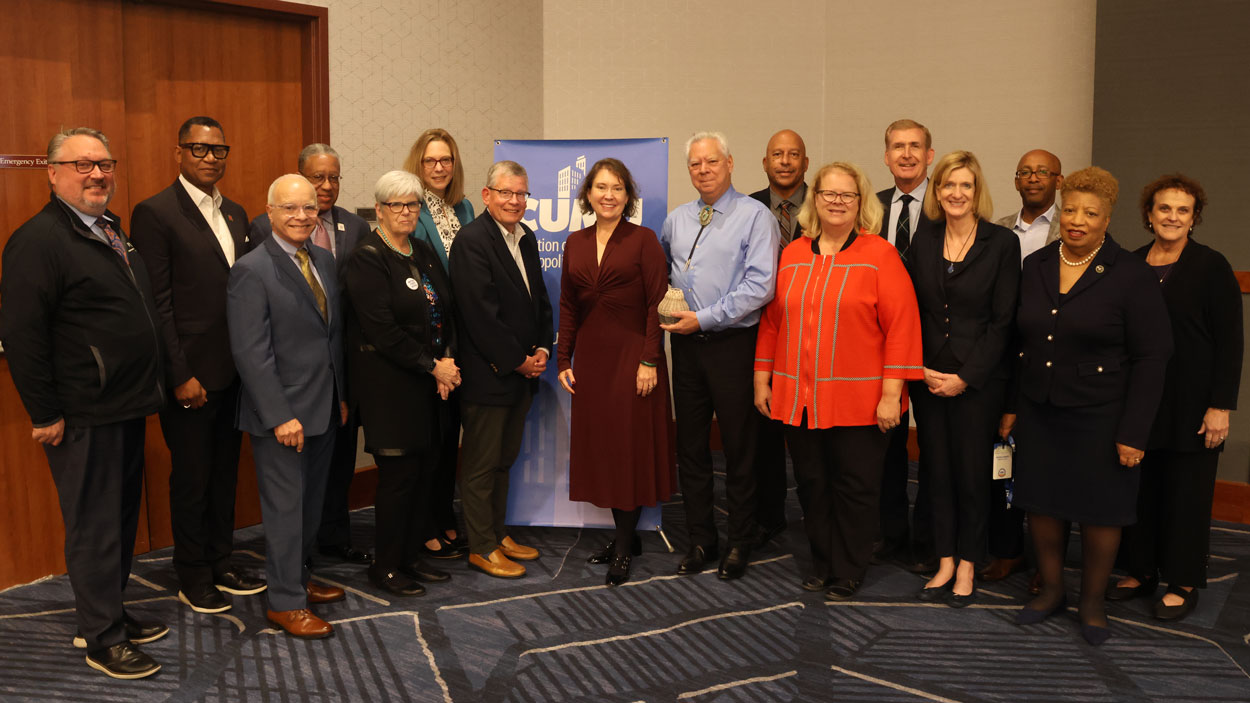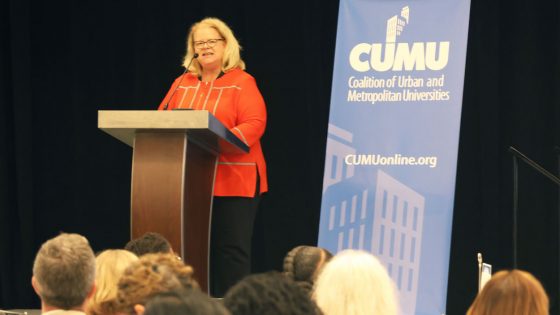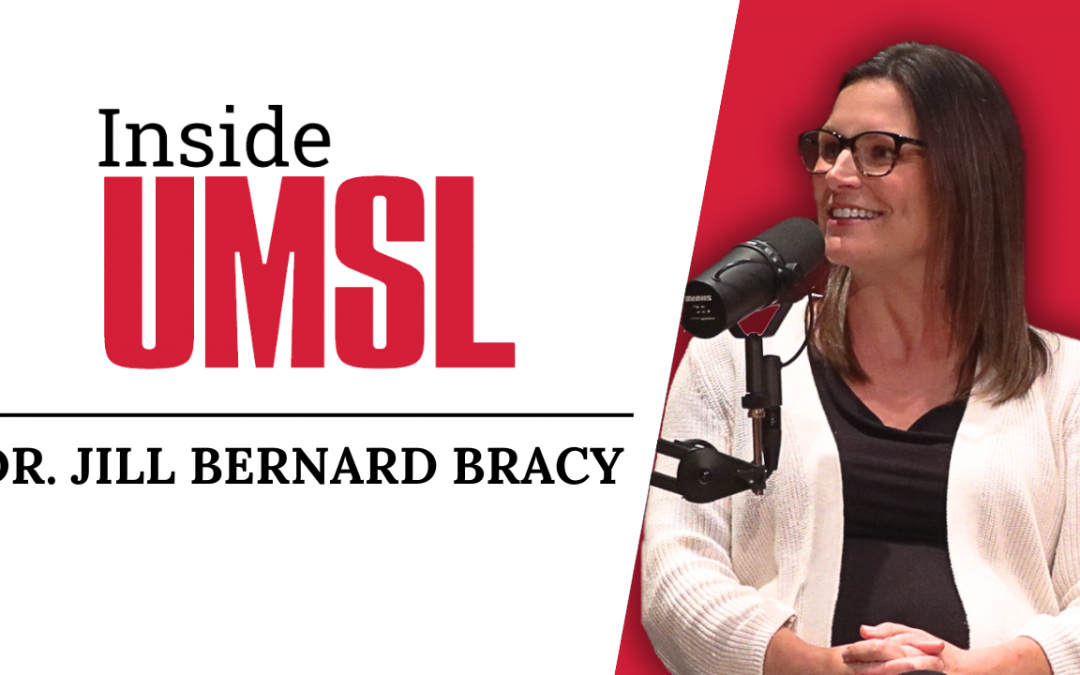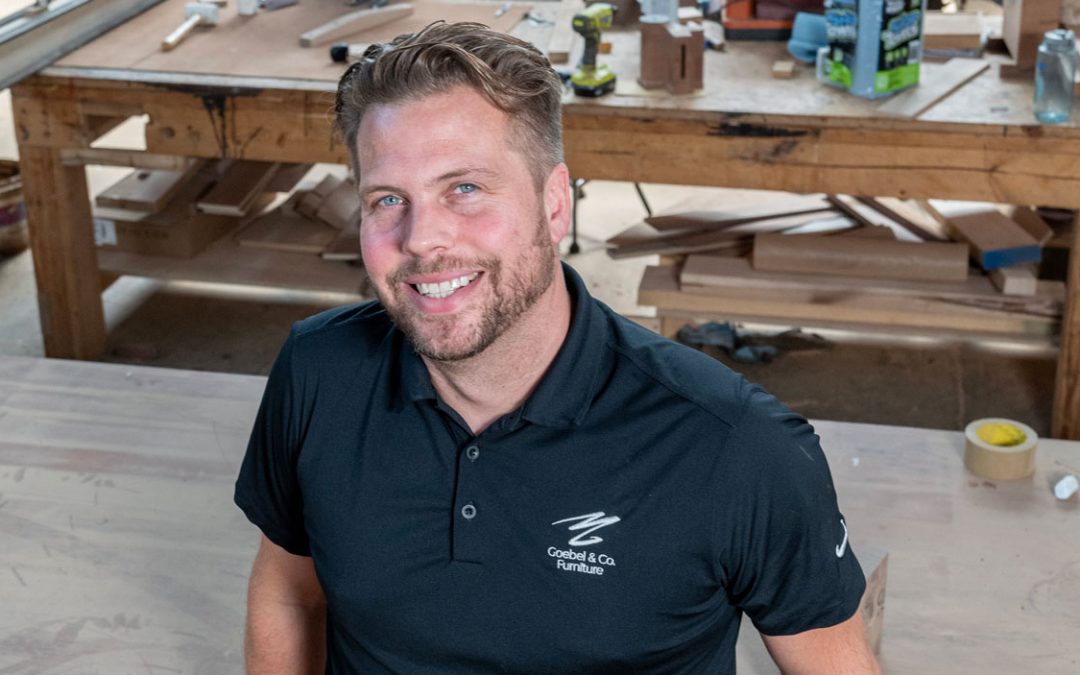
UMSL Chancellor Kristin Sobolik (front row, third from right) was among 30 presidents and chancellors from member institutions in the Coalition of Urban and Metropolitan Universities who attended CUMU’s annual conference last week in Minneapolis. Sobolik is entering her second year as chair of CUMU’s Board of Directors. (Photos courtesy of the Coalition of Urban and Metropolitan Universities)
Through education and outreach, urban and metropolitan universities play an important role in shaping the future of their communities. As its only public research university, the University of Missouri–St. Louis is a driving force in the St. Louis region, providing educational opportunities to a diverse group of students and preparing them to meet the workforce and research needs of the area.
“Higher education has evolved significantly from the days in which land grant institutions were placed and developed in agricultural regions of states to support that important economic sector,” Chancellor Kristin Sobolik said. “Today, the economic drivers of the nation are the urban and metropolitan regions, and it is imperative that higher educational institutions evolve to reflect that change and to support that economic focus and shift. The future of our nation depends on it.”

UMSL Chancellor Kristin Sobolik addresses attendees of the Coalition of Urban and Metropolitan Universities’ annual conference last week in Minneapolis.
That’s a mission UMSL shares with the Coalition of Urban and Metropolitan Universities, of which it has served as a founding member since 1989. The coalition focuses on strengthening institutions as they develop new responses to the pressing educational, economic and social issues impacting their communities.
As the only public research university in the St. Louis region, UMSL embodies the core mission of CUMU. UMSL provides access to a Tier One education and fulfills the promise of delivering degrees that have a meaningful impact on individuals, families and the inclusive economic growth of the St. Louis region and beyond. With the largest alumni network of any educational institution in the area, UMSL plays a vital role in producing the workforce needed to sustain and grow the region’s economy. From its founding 61 years ago, UMSL has served as an anchor for St. Louis, setting an example of leadership that has inspired other urban and metropolitan universities across the nation to do the same in their regions. The continued success of these institutions is essential to the future of our nation.
Over the past three years, UMSL faculty and staff from all corners of the university have presented posters and led interactive sessions, huddles and discussions at CUMU’s annual conference, including Sheila Grigsby, an associate professor and the Dean’s Fellow for Community Engagement in the College of Nursing; Brandon Ofem, an associate professor in the Department of Global Leadership and Management in the College of Business Administration, and Natissia Small, who formerly directed the Bridge Program for more than a decade.
This year, 15 members of the UMSL community attended the conference, held Oct. 20-23 in Minneapolis, including Sobolik, Vice Chancellor for Research and Economic and Community Development Chris Spilling, College of Optometry Dean Keisha Elder and College of Business Administration Dean Shu Schiller. Presenters from the UMSL community included Jill Bernard Bracy, an associate professor in the Department of Supply Chain and Analytics; Natalie Bolton, an associate professor in the College of Education; and Stefani Weeden-Smith, Prima Wagan and Ifeanyi Ukpabi with the St. Louis Anchor Action Network.
Bernard Bracy presented a poster titled “Addressing the Critical Talent Gap in Transportation,” which focuses on bridging the gap between unexplored career pathways in transportation and high school students. The presentation highlighted the labor and skills shortages in the transportation industry, particularly in the St. Louis region, and how many high school students are unaware of career opportunities in this sector. Bernard Bracy discusssed how UMSL’s Department of Supply Chain and Analytics, in collaboration with the Missouri Department of Elementary and Secondary Education, is bridging this gap through the Missouri Career Pathways program. The initiative promotes relationships between high school educators, post-secondary institutions and industry partners to provide students with pathways for career success in the transportation industry. Bernard Bracy’s presentation was designed to provide a framework for others to administer career workshops to encourage high school students to explore rewarding career pathways in industries experiencing talent shortages.
Bolton’s presentation covered the UMSL Post-Doctoral Fellowship Translational Research in Practice program, which provides mentorship and professional training to post-doctoral fellows to support K-12 public school sites in St. Louis, addressing site-identified problems of practice using an inquiry cycle embedding learning science principles and data analytics. During her session, Bolton highlighted an impact evaluation assessing the effectiveness of meeting five program outcomes aligned with a framework. She also discussed four case studies addressing practical educational challenges with partner K-12 charter schools and other K-12 educational sites using translational research: co-teaching, lesson internalization, social-emotional learning and virtual coaching for Teachers in Residence.
In their presentation, Weeden-Smith, Wagan and Ukpabi provided an overview of how the St. Louis Anchor Action Network refined its initial goals after five years of implementation and troubleshooting to ensure a more sustainable impact goal. The Network’s initial impact goal was to increase hiring and spend in the focus geography, which includes 22 of the St. Louis region’s ZIP codes that have faced prolonged periods of disinvestment, by 10%. The session from Weeden-Smith, Wagan and Ukpabi highlighted challenges sustaining that initial impact goal, as it became clear early that measuring impact would not be simple. Network institutions struggled to find businesses within the focus geography that provide services at the scope needed by anchor members, for instance, and population loss throughout the region challenged efforts to recruit skilled employees. The Network determined that the 10% impact goal was not sustainable over time. Participants at the CUMU presentation were able to observe the Network’s trajectory and learn how to revise their impact goals to better match the empirical realities on the ground. The session concluded with a discussion of how the Network revised its goals to center improving wage equity, retaining a local and inclusive workforce and determining non-supply chain supports for local businesses.
“There is no other conference in which we would have such diverse representation of the institution,” Sobolik said. “It is everywhere and everything that we do.”
UMSL’s commitment to advancing the work of CUMU isn’t just limited to the annual conference, however. In June, the university hosted CUMU’s Anchor Learning Network Action Summit. The year-long, cohort-based program brought representatives of 22 higher education institutions from across the country to St. Louis to learn about the work of the St. Louis Anchor Action Network, of which UMSL is a co-lead, to promote greater prosperity across the St. Louis region by working to increase hiring and purchasing in its focus area.
Sobolik, who first joined CUMU’s executive committee in 2022, has been excited to watch UMSL continue to play a leading role in advancing the mission of CUMU. In July 2023, she began serving as interim board chair and assumed the position permanently after a unanimous vote of presidents and chancellors representing CUMU’s more than 120 member institutions held last October at the 28th annual conference in Washington, D.C.
In her first year as board chair, Sobolik – along with CEO Valerie Holton and the rest of the coalition – has been focused on thoughtfully and strategically positioning CUMU for future growth and success. They’ve worked to expand relevant programming for CUMU member institutions, grow the organization’s support infrastructure and modify the bylaws to better reflect that of a forward-looking organization. They also added new member institutions, including Washington University in St. Louis and Saint Louis University.
“We are grateful for the role that UMSL and Chancellor Sobolik have played in helping to guide the work of CUMU over the years,” Holton said. “The university has been a key partner as we elevate and enhance the transformative and innovative work happening at our member institutions across the country.”
As Sobolik enters her second year as board chair, she’s firmly focused on implementing those goals. In particular, she and the other board members, as well as many leaders from CUMU partner institutions, will write op-eds that illustrate the direct economic, educational and societal importance and relevancy of urban and metropolitan universities while also directing their programming internally to support CUMU members in this work.
Higher education is more important and relevant today than ever, particularly for universities that serve as anchors in urban and metropolitan regions. However, many people are questioning its value, both in their personal lives and within society. As an institution committed to supporting students and communities, it is essential to address this gap in perception by taking actions that clearly communicate and demonstrate the value and relevance of higher education to individuals and to society at large.
In 2025, Justin Roberts, UMSL’s associate vice chancellor for marketing and communications, will lead a six-part CUMU huddle series – an informal, online learning community for individuals across the CUMU network – focused on strategic communications. CUMU has not previously hosted a huddle or other programming focused on communications, and Sobolik said the huddle is a concrete example of the organization expanding its programming to be educationally relevant to the needs of its institutional members. As communication becomes a central pressure point both within institutions and externally, the huddle will serve as a way to help CUMU members craft compelling narratives, engage with journalists and media outlets, use digital platforms to expand their reach and more.
Sobolik firmly believes that UMSL and CUMU share a mission and vision, and she thinks UMSL can serve as a valuable example for other urban and metropolitan universities.
“From its inception, UMSL has been focused on aligning its programming, curriculum, research and engagement to the needs of its students and the surrounding community,” Sobolik said.
For example, UMSL’s research and sponsored activity has grown by over 300% over the past six years, most of which is aligned to the needs and support of our community, corporate and regional partners. Another example is that 75% of UMSL alumni live and work in the St. Louis region, driving the regional workforce and economy. These examples illustrate the direct impact a higher educational institution such as UMSL can have on their region, illustrating the literal value proposition of higher education at a time when people are questioning that value.














